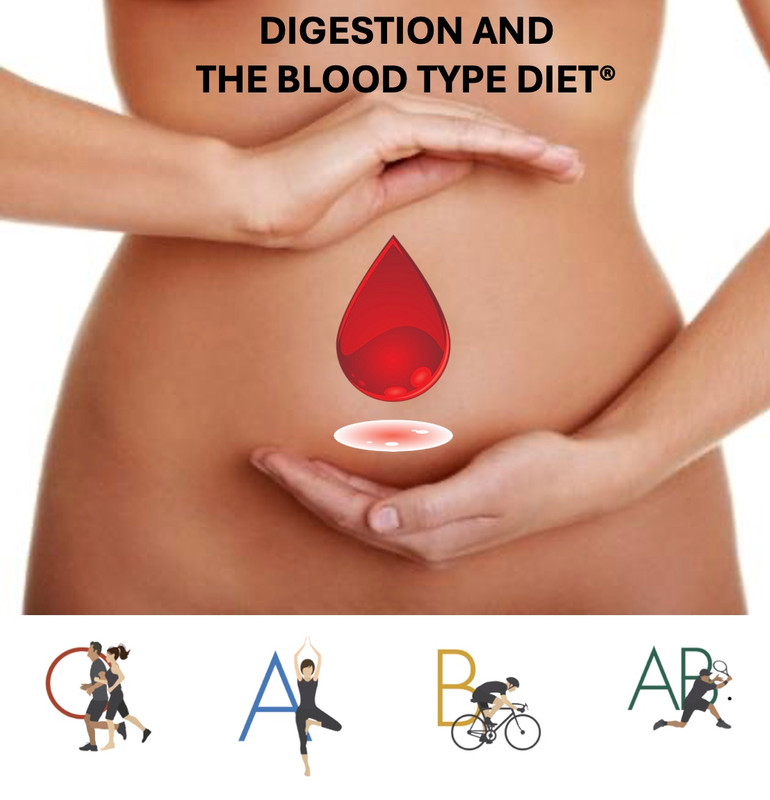
Your blood type affects how your whole digestive tract works. Many foods contain components that react directly to blood group antigens, which can lead to inflammation and the production of toxins.
The entire lining of the gut is covered by a protective film called mucin. It's made up of protein molecules, and these molecules vary by blood type. Bacteria and viruses can stick to this mucus layer - including the “good germs” that help our digestion work more efficiently. Another kind of protein in the mucin layer is a type of antibody called IgA. Both low and high levels of IgA are associated with different kinds of diseases. Lectins in food can affect the amount of IgA in the gut.
The Blood Type Diet® is low in harmful lectins. This helps keep IgA levels in a healthy range.
- Blood Type Bs and ABs should not eat chicken which contains especially harmful lectins to both blood types.
- Blood Type Os should not eat Wheat, Corn, Kidney Beans, Navy Beans, or White Potatoes.
- Blood Type As should avoid Milk, Lima Beans, White Potatoes, and Oranges.
- Blood Type Bs should stay away from Corn, Peanuts, Lentils, and Buckwheat.
- Blood Type ABs should avoid Corn, Buckwheat, Lima Beans, and Kidney Beans.
Saliva contains enzymes and hormones that digest food and kill germs. Carbohydrate digestion starts with chewing, and some sugars are absorbed directly into the blood stream from the mouth.
When food enters the stomach, gastric juice is released. It contains enzymes, hydrochloric acid, and blood type antigens. The acid destroys some germs in food, protecting the gut from infection. Hydrochloric acid can back up into the esophagus, causing reflux and heartburn. When foods digest well, the stomach empties faster, reducing the chance of heartburn. If there's not enough hydrochloric acid, protein digestion will be incomplete, and bacteria can overgrow in the stomach and intestines.
Type Os tend to have higher stomach acid, while Type As have the least. This is why Type Os do better when they eat more animal protein, and As do better with less. Type As have extra trouble digesting red meat, while doing fine with some poultry and fish.
Then food moves into the small intestine, where digestion continues in an alkaline environment. Hormones are released into the blood stream as this happens. A hormone called CCK tells the pancreas to secrete pancreatic juice and the liver to secrete bile into the small intestine. It also tells the stomach to contract, helping us feel full, and goes to the brain where it helps with appetite control. Several food lectins can influence CCK levels. For Blood Types A and AB, soy is especially good at enhancing CCK- improving digestion and making you feel full. Wheat germ decreases CCK, so it should be avoided or minimised.
Pancreatic juice contains enzymes that break down proteins, fats, and carbohydrates. While protein digestion starts in the stomach, it finishes in the small intestine. There are enzymes on the surface of the small intestine that finish breaking down food right before it gets absorbed. There are a lot of blood group antigens here, and that effects how many of each kind of enzyme there are. Blood Type A people have more of the enzymes that break down carbohydrates, digesting them more fully and easily than other blood types. This works well with their low stomach acid, making them thrive on less meat and more beans than other types.
The large intestine, or colon, is where most of the water gets absorbed. The colon works best with fibre to add bulk to the contents. Insoluble fibre acts like a sponge, soaking up liquids, and helps food move through the digestive tract more efficiently. Soluble fibre softens the stool and binds to some toxins, allowing them to safely exit the body. Besides the main categories of soluble and insoluble, the fibre from each individual food will be a little bit different. We can't digest fibre, but some of our gut bacteria can eat it. Since gut flora varies by blood type, the food for these bacteria will vary too. Flatulence and bloating can be a sign that you're taking in the wrong kind of fibre for your body.
When you follow the Blood Type Diet®, you'll be getting plenty of both soluble and insoluble fibre from vegetables, fruits, beans, nuts, and whole grains. By choosing the foods that are right for your type, you're also choosing foods that are right for your gut flora, and that you have the right enzymes to digest fully.
How do you get started?
For more information, you can refer to Dr. Peter J. D'Adamo's books, Eat Right 4 Your Type® and Live Right 4 Your Type®, or if you want to take advantage of the must up to date research, then let Body and Mind Studio® GenoType you using Dr. D'Adamo's SWAMI GenoType III Software to give you a totally personalised plan based on YOUR blood type and genetic makeup.
Peter J. D'Adamo, ND, MIFHI
Peter D'Adamo is a distinguished professor of clinical sciences at the University of Bridgeport College of Naturopathic Medicine, USA, a naturopathic physician, author, researcher-educator, Ivesian, software developer and air-cooled enthusiast. He is a recognised authority in glycobiology, particularly the ABO blood groups and the secretor (FUT2) polymorphisms. He is versant in several computer languages, with SWAMI (serotyping with advanced modifiable inventories) and OPUS23 just two of his software applications currently in use.
Dr D'Adamo teaches Generative Medicine I and II, Introduction to Biochemical Individuality of Naturopathic Medicine, and supervises a specialised clinic shift in Personalised Medicine at the University of Bridgeport. He has published the first textbook in naturopathic systems biology, Fundamentals of Generative Medicine, Vol. 1 (Drum Hill Publishing, LLC).
He is the author of several popular books, all of which can be found by clicking here including the New York Times bestseller, Eat Right for Your Type (Penguin Putman) and most recently Change Your Genetic Destiny (Random House).
Paul Hopfensperger, MIFHI, MCMA
Paul Hopfensperger is a UK based Master Instructor for Dr. Peter J D'Adamo's Institute for Human Individuality at Body and Mind Studio®. He specialises in The Blood Type Diet®, The GenoType Diet® and OPUS23 Genomic Bioinformatics.





